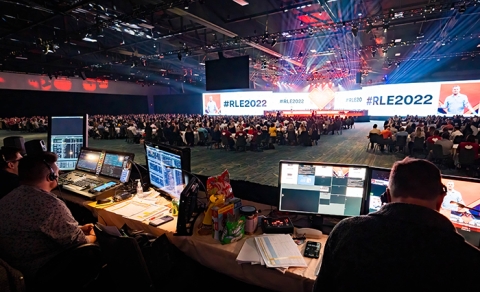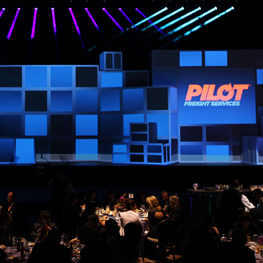Make Best Use Of Interaction with Interactive Components in Event Productions
Make Best Use Of Interaction with Interactive Components in Event Productions
Blog Article
Recognizing How Events Production Works: A Comprehensive Summary of the Process
The complexities of occasion production need a systematic technique that integrates several phases, each playing an important role in the general success of an event. From the first preparation and principle growth to the precise coordination of logistics, every element has to straighten seamlessly to attain the desired end result. Understanding the nuances of budgeting, resource allotment, and on-site administration is vital for any specialist in this area. As we discover these components even more, it becomes evident that the procedure is not merely concerning implementation yet likewise regarding continual renovation and tactical evaluation. What understandings can we obtain from each phase?
First Planning and Idea Growth
Effective first preparation and principle growth work as the structure for effective events production. This phase involves specifying the occasion's function, target audience, and desired end results. A clear vision is essential; it overviews all subsequent decisions and assists align the team's efforts towards a common goal.
Throughout this stage, brainstorming sessions can be indispensable. Involving stakeholders, consisting of clients, sponsors, and prospective guests, cultivates a joint environment that produces innovative concepts. In addition, detailed marketing research should be carried out to comprehend fads, choices, and prospective challenges.
Once the concept is established, it is vital to produce a comprehensive occasion overview. This rundown must consist of the occasion's motif, format, and vital activities. Developing a timeline is similarly vital, as it aids to manage tasks and due dates successfully.
Budgeting and Source Appropriation
With a solid principle in place, focus must turn to budgeting and resource allotment, which are vital elements in carrying out the event effectively. A distinct budget plan serves as a roadmap, describing all expected prices and readily available resources - Event Productions.
Resource appropriation includes appointing both monetary and human sources to various tasks and elements of the occasion. Prioritization is key; necessary components should obtain sufficient funding while much less important facets might need an extra traditional strategy. Backup preparation is critical-- assigning a section of the budget for unanticipated costs can mitigate monetary risks.
Additionally, reliable interaction among team members relating to budget plan constraints cultivates collaboration and technology. This advertises the accountable use resources and encourages creative remedies to stay within budget plan. Ultimately, a calculated technique to budgeting and source allotment lays the foundation for a successful event, making it possible for planners to focus on delivering a remarkable experience for guests while keeping financial stability.
Logistics and Sychronisation
Navigating the complexities of logistics and control is vital for the seamless implementation of any event. This stage involves careful preparation and company to make sure that all components operate in consistency. Trick aspects consist of location option, transportation plans, and the organizing of different tasks.
Efficient logistics begins with a detailed assessment of the venue's limitations and capacities. This consists of recognizing the design, accessibility points, and readily available sources. When the place is validated, transportation logistics need to be established, incorporating the motion of attendees, tools, and products. Collaborating these components needs partnership with suppliers, vendors, and transport services to make sure timely deliveries and pick-ups.
Another vital facet is the growth of a detailed timeline that outlines all logistical components leading up to the occasion. This timeline serves as a roadmap, detailing crucial landmarks and deadlines for jobs such as equipment arrangement, catering services, and audiovisual installments. Routine interaction with all stakeholders is important to address any type of prospective issues proactively.
Execution and On-Site Monitoring
Effective implementation and resource on-site administration are important for transforming careful plans into fact throughout an event. Their ability to make real-time decisions can dramatically influence the occasion's success.
A distinct timetable is important, offering as a roadmap for all activities. Occasion managers have to make sure that setup happens in a timely manner, adhering to timelines for audio checks, catering shipments, and visitor arrivals. Effective analytic abilities are additionally essential; unforeseen challenges can emerge, requiring fast reasoning and versatility to keep the event's flow.
Furthermore, interest to visitor experience is paramount. Checking guest interactions, making sure safety and security procedures are complied with, and giving assistance team to attend to worries promotes a positive environment. This degree of engagement not only improves the general experience however likewise shows the professionalism and trust of the occasion team. Event Productions. Ultimately, effective implementation and on-site management depend upon in-depth prep work, reliable interaction, and a commitment to delivering an exceptional event for all included.

Post-Event Examination and Responses
The end result of any occasion exists not just in its execution yet additionally in the extensive assessment that follows. Post-event examination is crucial for determining the overall success of the event and identifying areas for enhancement. This process typically includes gathering comments from various stakeholders, consisting of attendees, suppliers, and group members, to gain a comprehensive point of view on their experiences.
To structure the evaluation, occasion coordinators usually make use of studies and meetings, concentrating on crucial performance indications such as participant fulfillment, logistical effectiveness, and spending plan adherence. Evaluating this data permits organizers to evaluate whether reference the event met its goals and to recognize the toughness and weaknesses of the execution.
By methodically dealing with responses and carrying out modifications, event professionals can improve their techniques, inevitably leading to even more successful and impactful occasions. In final thought, post-event analysis is an important step in the occasion production process that guarantees continuous development and quality in future endeavors (Event Productions).
Final Thought

The complexities of occasion production demand a systematic approach that incorporates numerous phases, each playing an essential duty in the total success of an event.With a solid idea in area, attention has to turn to budgeting and source appropriation, which are crucial parts in carrying out the occasion effectively.Resource appropriation entails designating both economic and human resources to various jobs and elements of the occasion. Ultimately, a critical approach to budgeting and resource allowance lays the foundation for an effective event, allowing organizers to concentrate on providing a memorable experience for participants while preserving economic stability.

Report this page